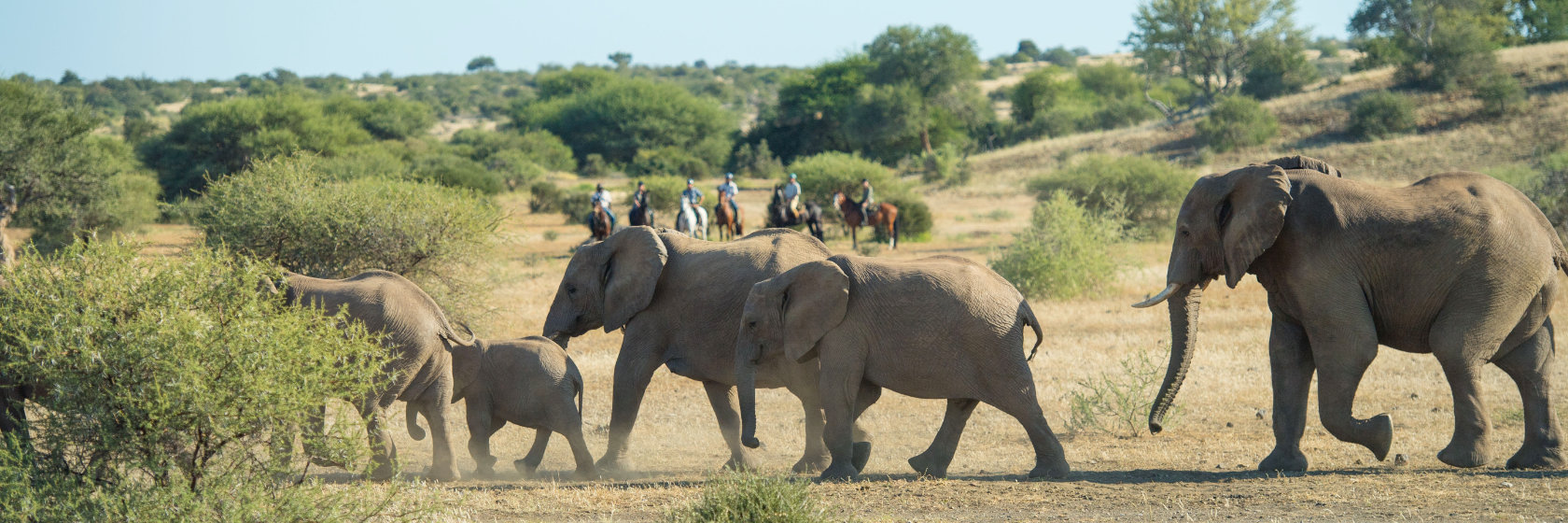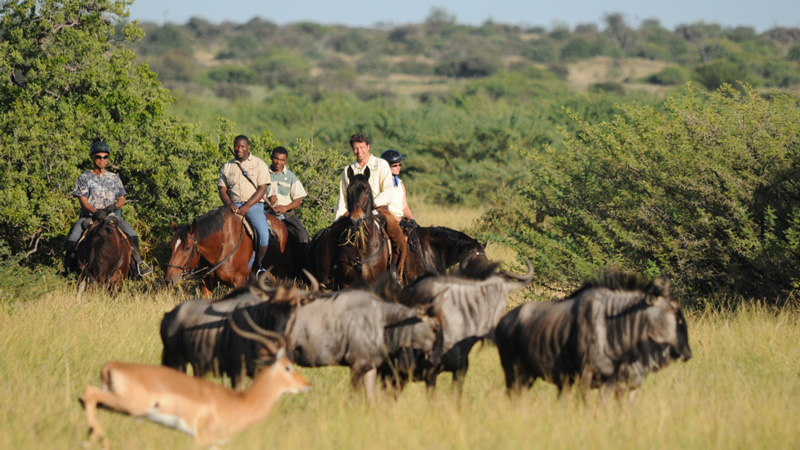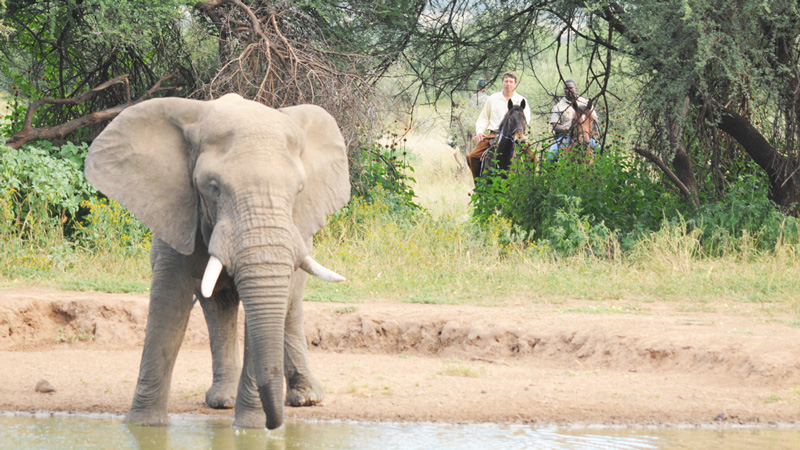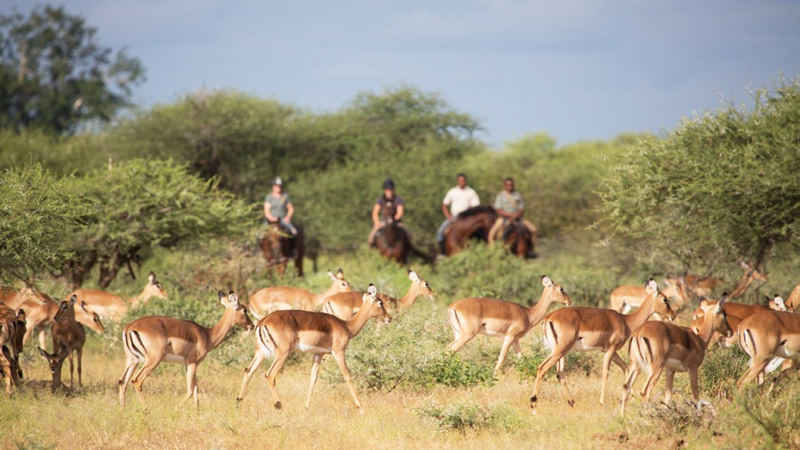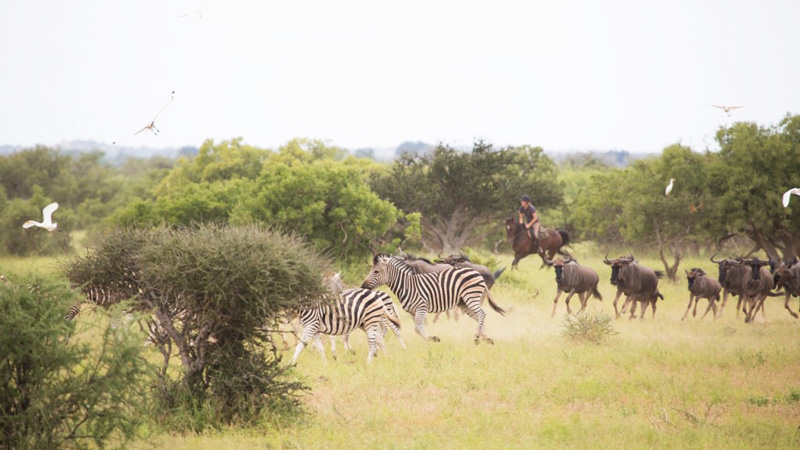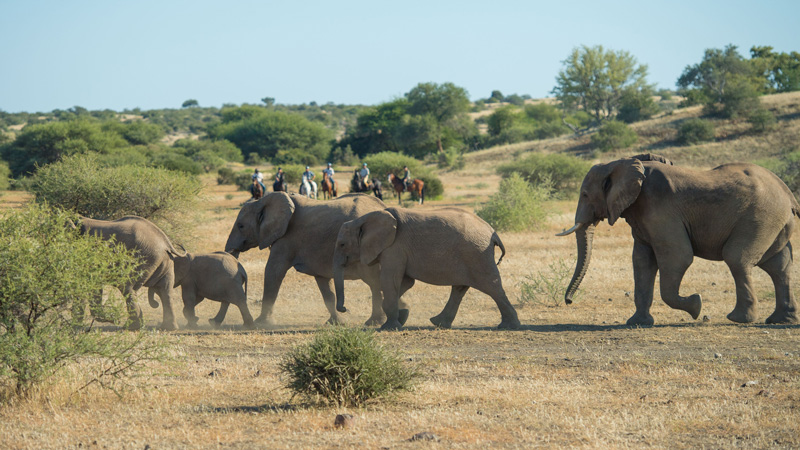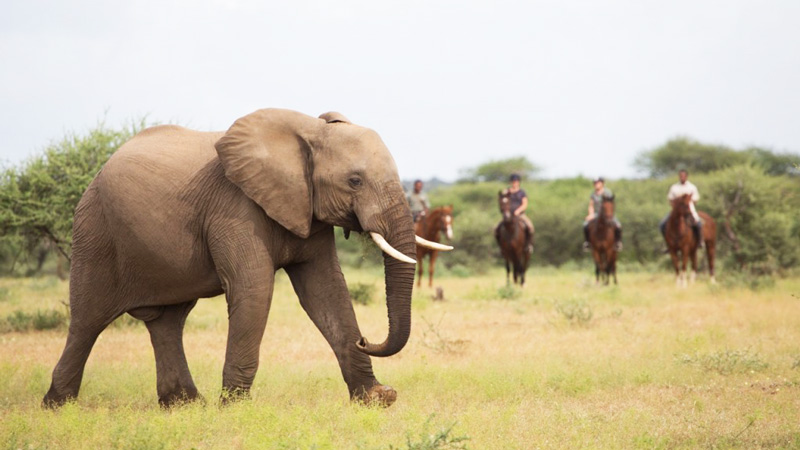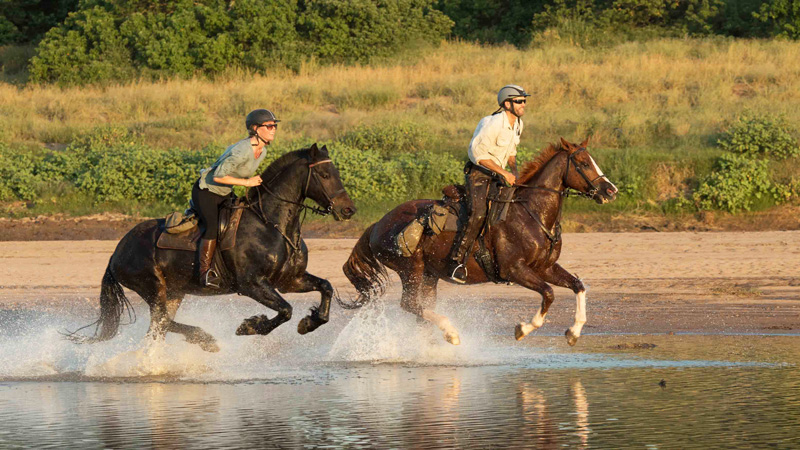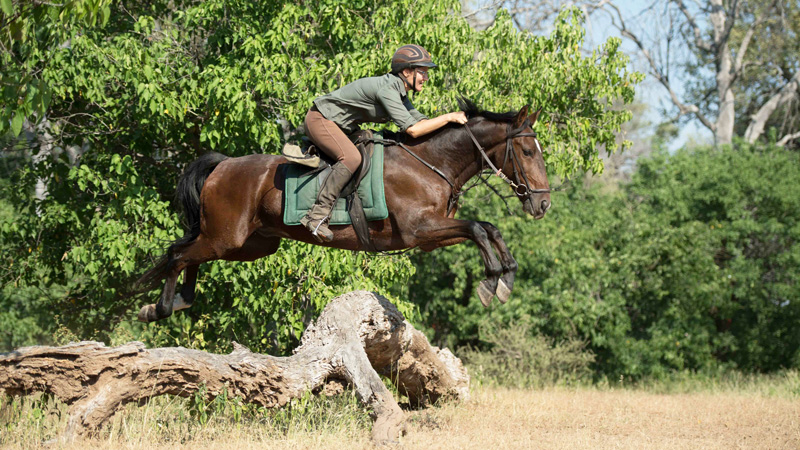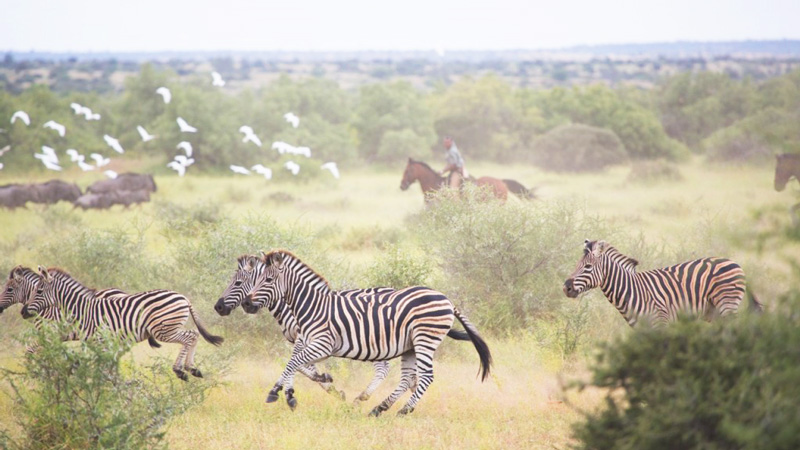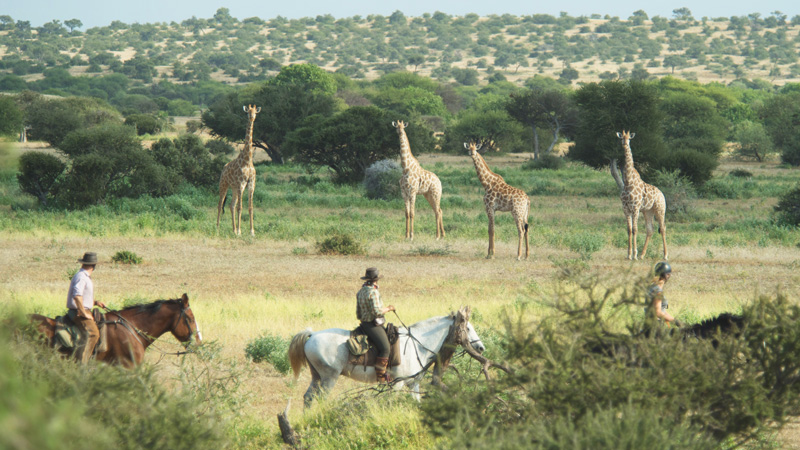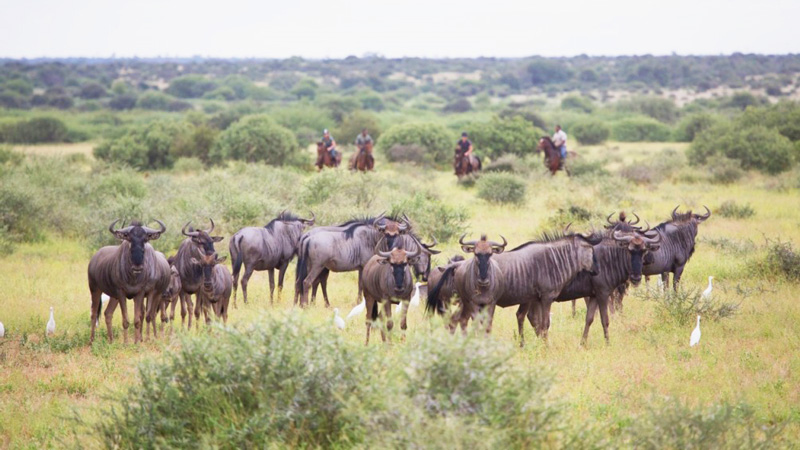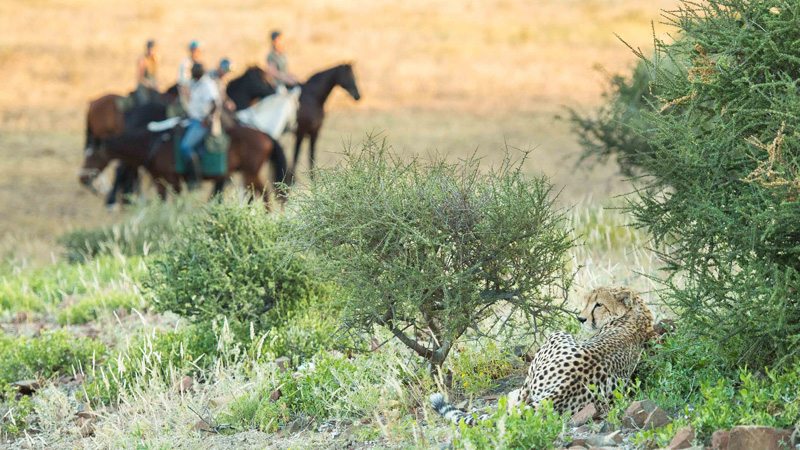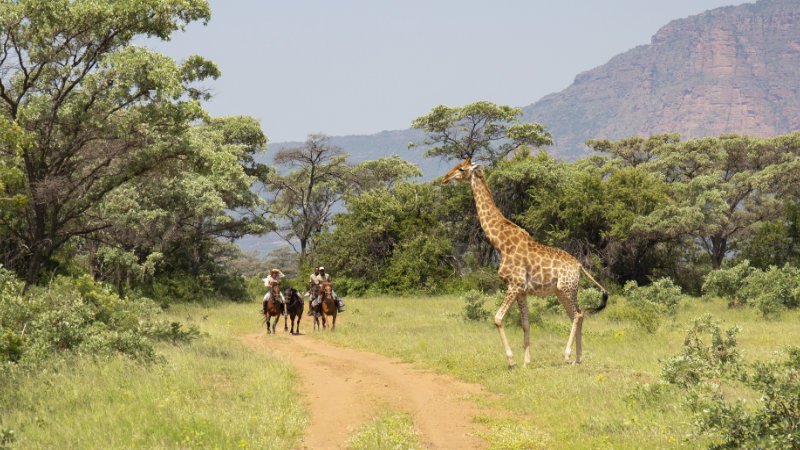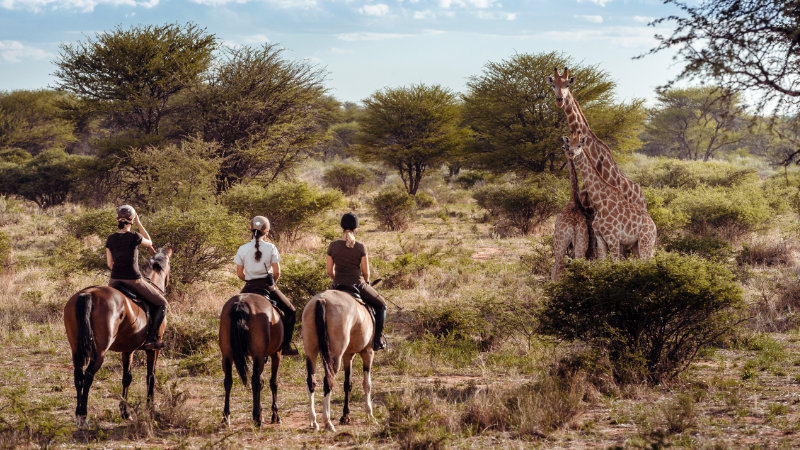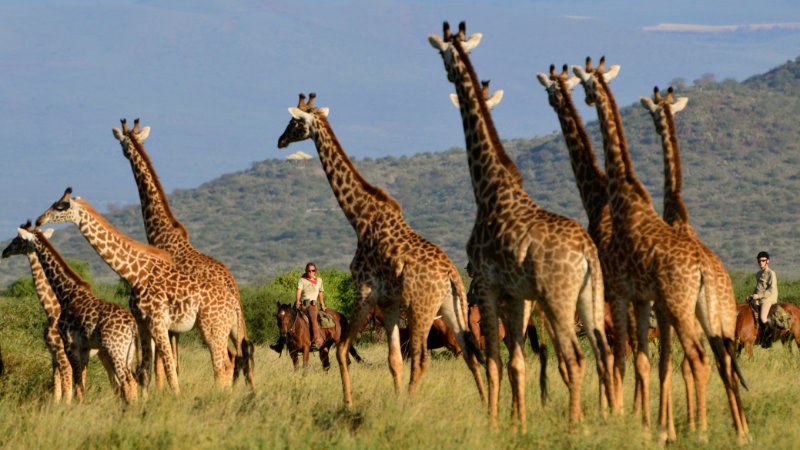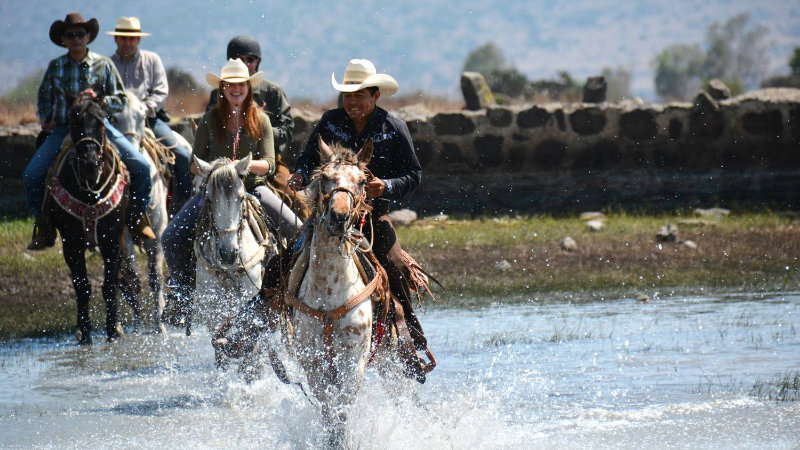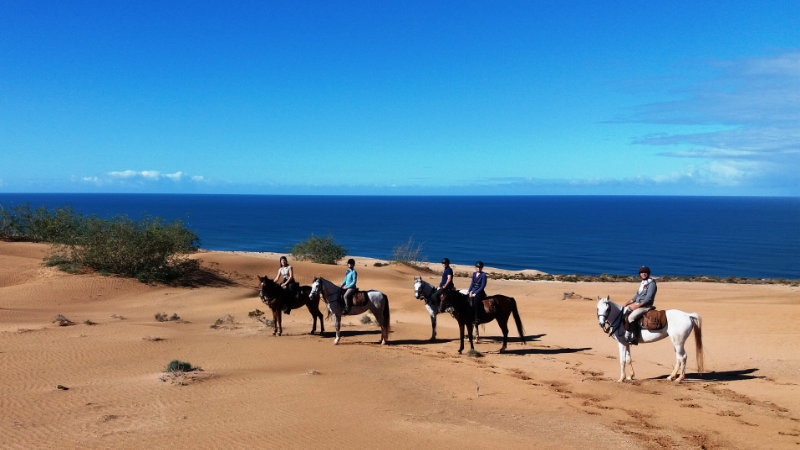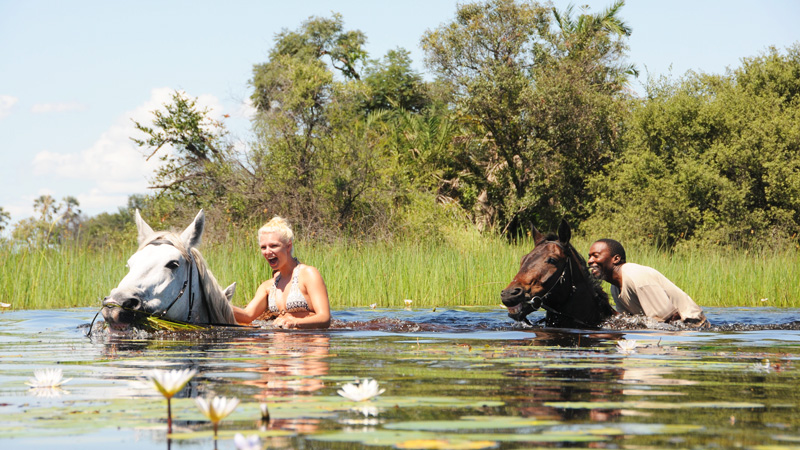Botswana - Tuli Safari
Mashatu Game Reserve is located in the Northern Tuli Game Reserve - the eastern tip of Botswana. Mashatu covers 30,000 hectares and is home to great herds of elephant, estimated to be at least 800 strong.
As well as numerous cats, including leopards, lions, cheetah, African wild cat and cerval, the Tuli Block is known as 'The Land of the Giants' for good reason - the magnificent Baobab tree, huge sandstone outcrops, magnificent plains and of course, the Mashatu trees, are all prevalent along the great Limpopo River. The area is perfect for riding, offering good going with natural ditches and logs to jump, adding that extra dimension to an already exhilarating ride. Guests can expect regular game sightings, not only of the elephants and cats but also of antelopes, jackals, bat eared foxes and giraffe. The occasional canter across the plains with zebras and wildebeest will leave you with memories of an unforgettable riding holiday.
Program Tuli Safari
Tuli Safari is a seven night mobile safari, which covers approximately 120 miles over the course of the week and is scheduled from March to November. Each riding day ends at beautiful camps with welcoming walk-in tents, full size beds, fresh cotton linen and hot showers. The safari embraces fine dining in the wilderness and every evening is a delightful mix of good food and good company.
Preliminary program
Day 1: Meet your guide at the border. Short transfer to the reception area overlooking the Limpopo river, in time for a light lunch. Enjoy an introductory ride to check you are suited to your horse, before embarking on your first ride out to our Two Mashatus Camp. This will be your first opportunity to experience the beauty of the Mashatu Game Reserve and view the wildlife on horseback. Mashatu Game Reserve is home to the largest herd of wild free-roaming elephants on private land in Africa, and, although not a guarantee, it is almost assured that there will be great viewing of these incredible creatures. As evening falls at Two Mashatu Camp, relax in the cool of the thatched rondavel lounge and dining areas, before enjoying a three-course dinner and getting to know your fellow adventurers for the next seven days.
Day 2: Sunrise and the dawn chorus, with tea or coffee which is brought to your tent, sounds the start of your first day. Following a light breakfast, it’s time to mount and depart from the dense woodland that hugs the Limpopo River, and head towards the rocky hills that delineate the edges of the great river valley. As the ride traverses the heartland of Mashatu, you will encounter plentiful game: plains game, many giraffe and herd of elephants. Having meandered across the hills with vast views back towards South Africa, the ride arrives at Tree Camp in time for lunch. This is a very unique camp; any childhood dream of sleeping up in the arms of a tree, will be completely fulfilled here. Nestled in the bough of a giant Mashatu tree and two ancient Leadwood tree, this Selinga deck, 4 meters off the ground, will be your retreat for the night. Overlooking the Majale river, it is possible to watch the wildlife from above, coming down to drink at the river. That afternoon choose a ride or enjoy your first bush walk exploring the area along the West of the Matabole River returning to Tree Camp for sundowners.
Day 3: The safari passes through the centre of Mashatu to the ancient rock formations synonymous with the Limpopo Valley. Giant Baobab trees continue to scatter the landscape as they have for centuries. Whilst riding alongside the banks of the Motloutse River, discover the old Leadwood ‘Kgotla’ (or enclosure used for the traditional law court of a Botswana village). This open-air enclosure forms the perfect, secure camp for the night. In the afternoon, we embark on a game drive, this area of mashatu offers some of the best game viewing in the reserve. We draw the day’s adventures to a close with sundowners at the ancient “Amphitheatre” rocks. Back at the Kgotla, dinner is enjoyed around a large log fire. The night is spent with a ceiling of stars and Africa’s nighttime melody to sing you to sleep; a veraciously rare experience which is just about as far away from city life and the modern world as anyone can imagine.
Day 4: The sandstone formations, including the famed Solomon’s Wall, one of the numerous dolorite dykes in the area, are explored on horseback. Some of the oldest civilisations in southern Africa settled in this valley. Archaeological evidence in the area includes middle and late stone age tools, rock art and the legendary
Mapungubwe Dynasty. Mapungubwe means “Place of the Jackal” in the Venda language and this dynasty existed around 1220 AD. The Mapungubwe topography itself is ancient and timeless, and combined with marvellous wildlife sightings, it makes for an incredible riding experience. This afternoon enjoy a short drive to the Mmamagwa Hills. For the most visually stunning and ethereal sundowner, we visit the Mmamagwa Hills. A short climb up the sandstone ridge, brings us to the site of the Mmamagwa Ruins, which is of a similar period to Mapungubwe (13 century). To date these ruins have not been excavated and have been left alone. It is conceivable that similar treasures to those found at Mapungubwe (for example the golden rhino) could be buried here. After a short climb, enjoy sundowners beneath a beautiful baobab tree with a breath-taking view of the area.
Day 5: Wind up Elephant Valley along ancient trails stamped into the soil by centuries of migrating elephants, before heading north towards upper reaches of the Majale River. This area is peppered with enormous baobab trees and is one of the more remote areas of the reserve. After an exhilarating ride through this timeless countryside, enjoy a relaxing lunch at Tree Camp. An afternoon ride or bush walk.
Day 6: Today the ride roams through the Pitsane River Valley. The river is fed by a spring high in the hills and its regular watering holes attract the wildlife, guaranteeing excellent sightings. The area is steeped in history: the Zeederberg Trail, a stagecoach line that connected the towns of the Transvaal (South Africa) to the newly forged settlements of southern Rhodesia (now Zimbabwe), once traversed theses open plains. The coaches would ford the Limpopo River before trailing the Pitsane River into Zimbabwe. En route there was an old British supply post, Bryce’s Store, which was destroyed here in a skirmish between British and Boer soldiers during the Boer war in 1899. Today bullets, buckles and other remains can be found in the rubble around the store. Our days journey comes to a close at Two Mashatu camp, where there is opportunity to relax by the swimming pool. A guided bush walk to one of the nearby koppies for sundowners is the afternoon excursion.
Day 7: Our ride today meanders its way through the beautiful plains between the Majale and Pitsane rivers, with abundant game and spectacular views into the Limpopo River Valley. En route, we explore the remains of an old Boer War fort on a rocky outcrop, followed by a ride down into the cooler wetland area where plentiful game enjoy the lush grasses. In the summer months, rain and water dependent, it can be possible to enjoy cantering through the shallows of the Limpopo River. There is time to relax in camp, before either an afternoon ride or bush walk for your last African sundowner.
Day 8. Your last ride in the Limpopo valley is a great opportunity to snap one last picture of elephants and a long and winding canter through the scattered Mustard bush with your guides. Arriving back at the stables with plenty time to enjoy a hot shower and a tasty brunch you get to s ay farewells to safari companions and new found friends, it’s time for your onward journey.
Program Tuli - MTB Safari
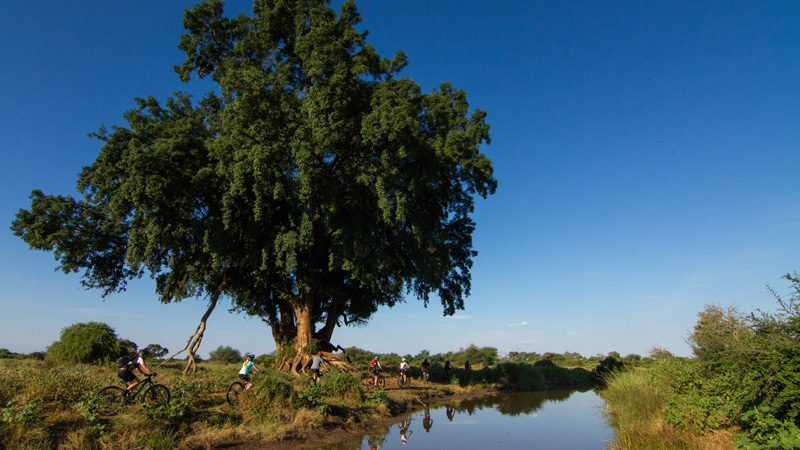
If your partner is riding but you prefer to ride a bike, you can follow on the ultimate African MTB experience. You follow roughly the same route as the riders and stay in the same camp and sometimes you will also meet for lunch. The guides are passionate cyclists and specialized field guides who do everything to ensure that you have an excellent cycling safari experience. Routes and distances are tailored to suit individual levels and cycling ability.
A relaxed ride will cover about 25km to 30km (18 miles) on a morning ride, with a maximum elevation gain of 150 meters (450 feet). More advanced riders might cover up to 50km (30 miles) a day with an elevation gain of about 250 meters (750 feet). The aim is to ride 3-5 hours per day. The pace is generally easy going with regular game sightings and scenic picnic stops, but be prepared, the riding at Mashatu is deceptively challenging.
The bikes are all 29inch generic aluminium 12 speeds mountain bikes with front shocks, the braking is lefthand front wheel, right-hand rear. They have a 12 Speed SRAM SX Eagle drive train and feature POP geometry, improving balance, climbing and traction. The slacker head angle of 67.5 degrees offer great handling over the technical terrain. They have small, medium, large and extra-large frames available. Pedals are flat one side and SPD cleat the other.
To book, proceed under Dates & prices below, Book on request - Tuli Safari. At Other information you fill in who should ride and who should ride a bike.
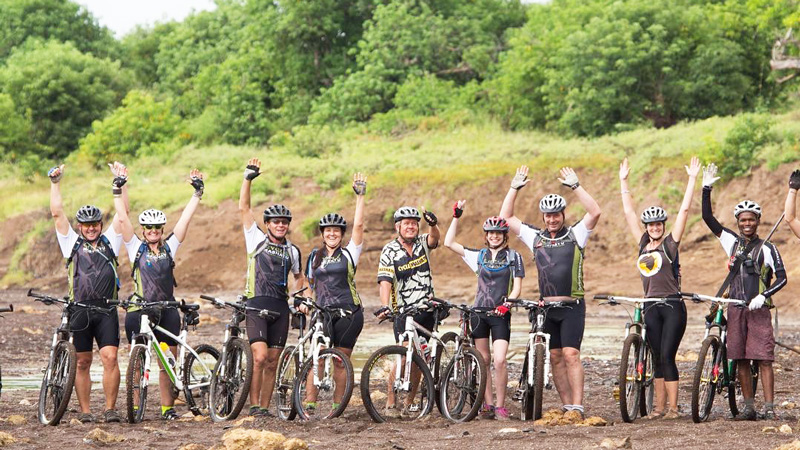
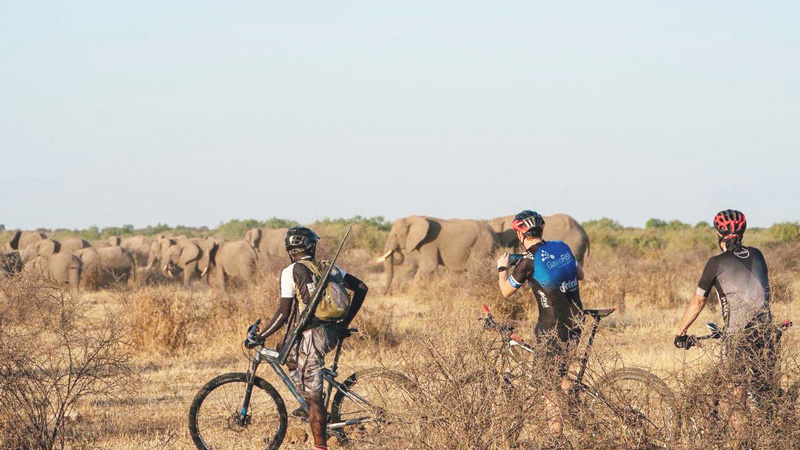
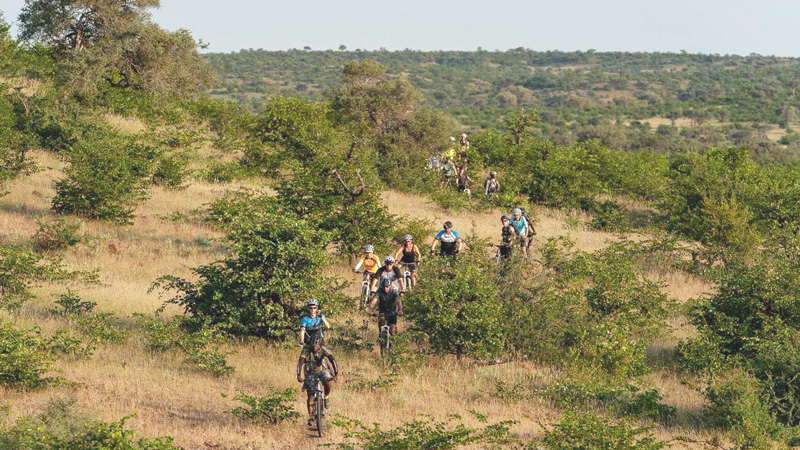
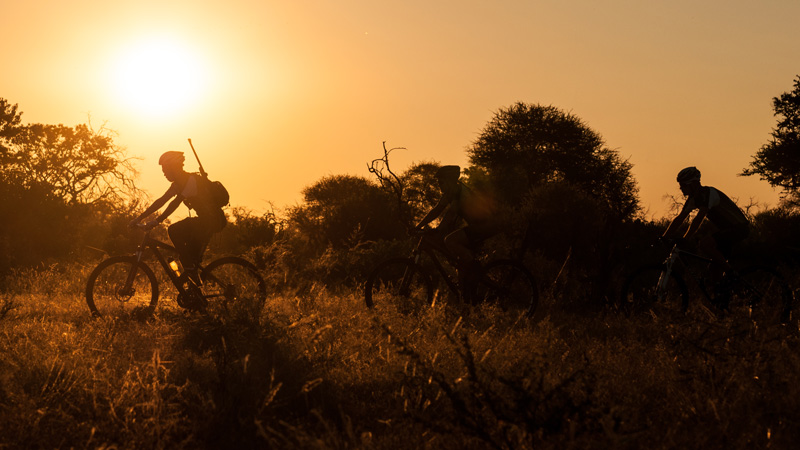
Horses
We have a herd of 50 horses in Botswana. The herd is comprised of Boerperd, Throroughbred, Warmblood and Arab crosses. Each rider will be matched to a horse, as much as possible.
Saddles: We ride in McClellan trail rider saddles. These are specifically designed for long hours in the saddle. They are comfortable for the horses and rider on long distances.
Hard Hats: Mandatory
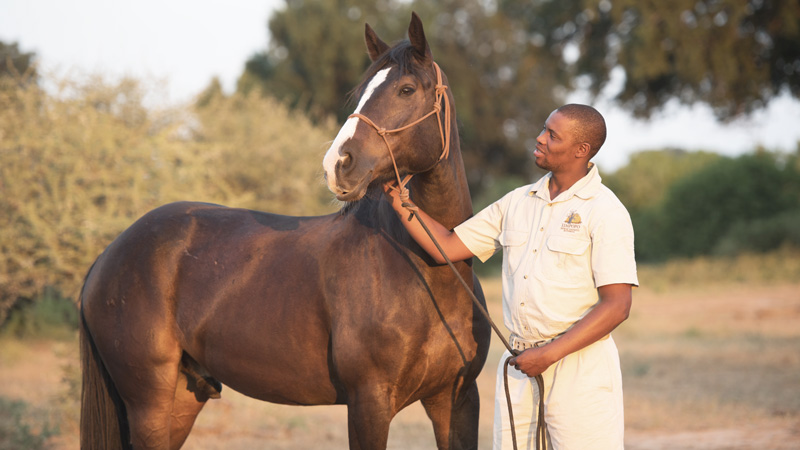
Accommodation
The Two Wilderness campsites are set up in specific locations on the Mashatu Game Reserve. Accommodation is in A frame tents with comfortable full size beds cotton sheets and duvets. Facilities include a bucket shower with hot water and “Bush-WC”. Meals are cooked over a camp fire. You will stay here the first and two last nights.
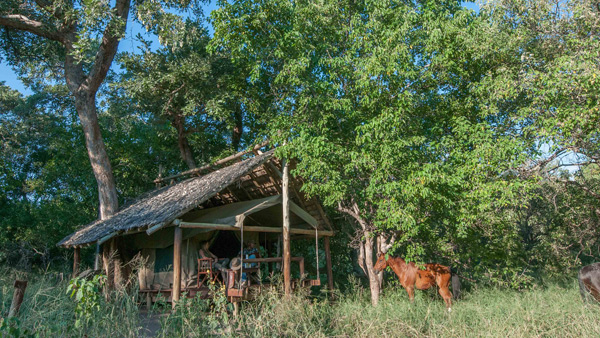
The Kgotla: The Kgotla is an old tribal court from a nearby community, which was relocated to the banks of the Motloutse River on the western periphery of Mashatu. The boma is an open-air traditional African enclosure made up of Leadwood logs. Guests sleep on beds around a large log fire which blazes at the centre.
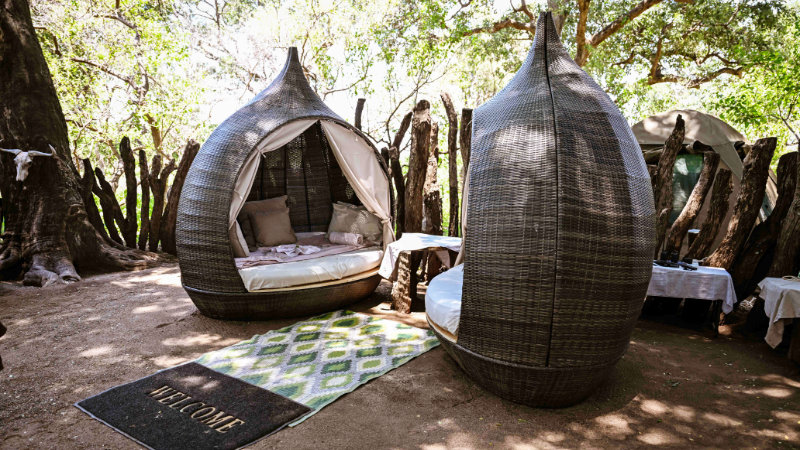
Tree Camp This is any child’s fantasy: literally a camp in a tree. A unique camp built 4 meters above the ground, around the boughs of an ancient Mashatu tree and two lead wood trees. Overlooking the banks of the Majale River, this spot offers a spectacular panoramic view of the adjacent cliffs and flood plain opposite where Mashatu's legendary elephant herds roam. Five beautiful, spacious canvas roofed areas house four poster beds and classic antique furniture. There is a spacious dining and lounge area on the elevated platform for relaxing. This truly extraordinary camp is one that will be remembered and spoken about for years to come.
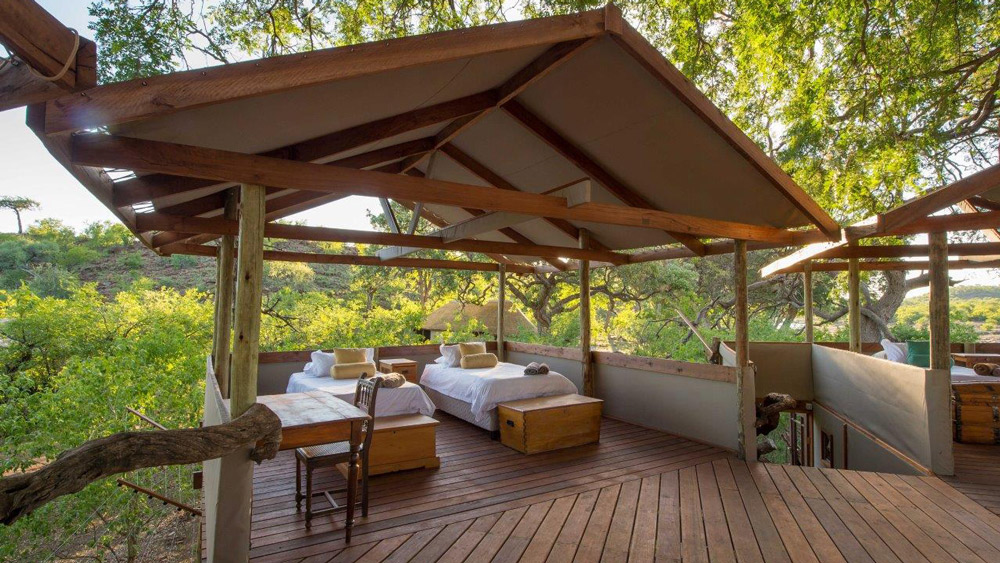
Wilderness accomodation. One of the nights you will stay in wilderness camps on different locations in Mashatu Game Reserve. Wilderness accommodation is in A frame tents. These tents are 3.5 x 6 metres so that you have the space you need. With beds, sheets and duvets this is very comfortable camping. A bucket shower is shared, while each tent has a long drop of its own. Meals are cooked around the fire.
Climate
In Tuli Reserve winters are dry and the summers warm and wet. Animals concentrate around the water sources during the dry season months of May to October making this the best time to visit Tuli for game viewing but the stunning landscapes are at their best in the summer months November to April when all the vegetation has greened up.
Best time to visit Tuli for wildlife
During the dry winter months the vegetation shrivels and the landscape takes on a bare look, making it easier to spot wildlife. This is also the time when the animals concentrate around the waterholes.
Best time to visit Tuli for birding
The summer months are the best time for birding in Tuli as it is the time when all the migrants are in the area and many of the nesting birds are active.


Travel Information
Ability description: Trail Ride Level 3>> Guests must be experienced riders. They must ride regularly (at least once or twice a week) and be comfortable at posting trot, light seat canter and gallop as well as being able to do small jumps should they have to. They must be able to control a horse independently of the group at all paces. On arrival in Botswana you will be asked to do a independent riding test.
Included in the price: Rate is inclusive of 7 nights accommodation, riding, meals, teas / coffees, drinks, game drives, bush walks and laundry. Only tips and curios payable locally in cash.
Not included: International flights, tips, transfer, personal insurance and extras not mentioned.
Travel: Book flight/rental car >>
Fly to Johannesburg.
Transfer: Book and pay to horseXplore before departure.
Flight: (Ivory Air/Bushwing Charter) from Johannesburg Lanseria Airport to Botswana.
Price 2025/2026: 952 EUR/person return.
Meeting point: A representative of Ivory air/Bushwing Charter will wait for you at the info desk in international arrival hall by 10.00am OR Tambo International Airport. Departure shuttle bus to Lanseria airport at 11.00am latest. Book a flight that arrive before 09.00 am on the arrival day.
Flying home, book a flight that depart from Johannesburg International Airport after 8.00 pm.
Road transfer: Book and pay to horseXplore before departure
Price 2025/2026: 1-3 persons / way/car 700 EUR. 4-8 persons / way /car 850 EUR
Meeting point OR Tambo Internatinal Airport, Johannesburg, information desk at 07.00am. Book a flight that arrive well in time before 07.00am on arrival day. Flying home, book a flight that depart from Johannesburg International Airport after 9.00 pm.
Note: maximum of 15kg luggage in soft bags plus a max of 6 kg hand luggage on Angel Gabriel air. Treat all luggage as hand luggage i.e. no bottles over 100mls or sharp objects, the light aircraft do not have closed luggage holds therefore all luggage is subject to the rules that apply to hand luggage.
Season: From Jan - December. High season: Mar - Nov. Middle Season: Feb Low Season: Dec, Jan
No of riders: Min. 2 and max. 8.
Currency: We suggest you exchange your cash into dollars and some rand, you shouldn’t need local currency as your holiday is fully inclusive. Botswana tourism levy can be paid in dollars. Gratuities, onsite curio shopping can be paied in Rand and dollars both in Botswana and SA
Tips: Not required but appreciated, around 5-10 $/day.
Electricity/wi-fi: In each tent there is a small solar charger that can charge most cell phones with a USB port. Limitied Wi-fi reception.
Safety: Hard hats are mandatory and you will not be able to ride without one. We can provide helmets, but suggest that clients bring their own.
Visa: You must be in possession of a passport that is valid for at least six months after your return date and has at least 3 blank pages. Visas are not necessary for most countries but we do advise that guests contact their local embassy and make sure they don’t need one.
Misc: Any extras, such as merchandise, massages, other activities/excursions, the Botswana conservation levy, (currently charged @ USD 20 pppn) the Mashatu Reserve game drive (currently charged @ USD 87.50pp) can all be settled by card on departure. Cash is of course accepted if preferred (GBP US$ Euro and ZAR) However please do let clients know to carry cash for gratuities. Again these can be offered in GBP, USD, Euro or ZAR.
Special Terms & Conditions
Payment and cancellation conditions that replace the General Terms & Conditions in the corresponding parts:
Terms of payment
- Registration fee 20% must be received by HorseXplore no later than 5 days from booking confirmation.
- Final payment 80% must be received by HorseXplore no later than 60 days before departure.
Cancellation policy:
In case of cancellation following fees will be charged
> 60 days prior to arrival 20% of the total price
59-30 days prior to arrival 50% of the total price
<30 days prior to arrival 100% of the total price
Your cancellation must be received in writing at our office during office hours no later than the specified number of weekdays before the start of your journey from home.
Feedback from our travellers
”Excellent camps. The food exceeded all expectations! Very good at every camp, great variation!. Very good quality of horses and riding. Best Holiday ever. True Adventure.
Add on is that I got excellent help talking directly to one women at horse explore who had domne the safari herself.
Very good service from horseXplore and I will for sure travel with them again.”
Gabriella Ardbo
"Such a great reception right at the airport! Felt so safe!! Exceeded expectations! Super comfortable beds. Cleaned twice a day. Neat and tidy. Soooo good! Amazing flavors and seasoning. Impressive to serve a three-course meal every day. And properly cooked meals. Fantastically well-cared-for horses. Healthy, with shiny coats and great condition. We could gallop for as long as we wanted without them even panting or sweating! (We were panting🤣). Such excellent service. Happy and friendly people. Professional guides. Far beyond my expectations. I enjoyed every second. HorseXplore was easy to communicate with and gave quick and friendly responses."
Birgitta Lundgren
"We were picked up at the airport by our friendly guide, and when we arrived at the riding center, we got to change and enjoy a good lunch with Lindy, who told us about the coming week. You got a good feeling right away. Cozy and simple bush camps, just as it should be on safari! Always delicious, well-prepared food. The vegetarian dishes were also good. Loved the long, wonderful gallops. I can still hear the guide: Canter! Great horses for riding safaris. They were very well cared for and well-treated, and they were ridden between safaris. The guides were excellent—knowledgeable, professional, and service-minded. It was a very successful trip. I don’t know what to choose for my next trip to even come close to the level we experienced now. I will definitely travel again with HorseXplore because I love both traveling and riding, and I want there to be high quality in both the riding and the horses."
Ann-Charlotte Saadieh
"They came to meet us at the airport, and then we flew by private plane to Lippomo Valley. Beautiful place. The horses were in top condition. The food was great, and the beds were comfortable. Good and varied food. Many different dishes that were prepared without electricity. Walking and galloping. The long gallop stretches were great, and then we walked to watch the animals on the plains. The guides were excellent, and the staff was also great. You could actually wash your clothes here, which I didn’t know. Fantastic, this is a trip you will remember for life."
Charlotta Bruncrona

